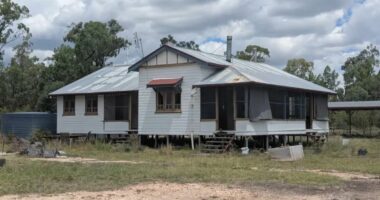Share this @internewscast.com
Is Sleep Apnea Hereditary? Sleep apnea is a prevalent yet serious condition marked by frequent interruptions in breathing during sleep. Expert Valerie Cacho, MD, explains, “If you have a first-degree family member [parent, sibling, or child] with the condition, your risk of developing sleep apnea—a blockage of the upper airway during sleep—increases by 50 percent.” This considerable familial link highlights the hereditary aspect of sleep apnea, especially obstructive sleep apnea (OSA), which results from physical blockages in the airway during sleep.

Understanding Sleep Apnea and Its Types
Sleep apnea primarily manifests in two forms:
- Obstructive Sleep Apnea (OSA): Caused by the relaxation of throat muscles leading to airway blockage.
- Central Sleep Apnea (CSA): Occurs when the brain fails to send proper signals to breathing muscles.
While CSA is mainly influenced by factors such as heart disease, stroke, or opioid use, showing limited evidence of being hereditary, OSA demonstrates a stronger genetic connection, making family history an essential risk factor.
4 Common Genetic Risk Factors for Sleep Apnea
Research has pinpointed several genetic markers and physiological traits that elevate the risk of sleep apnea. Significantly, a large-scale study involving diverse populations discovered multiple genetic loci linked to pediatric OSA, differing by sex and ancestry, indicating a complex genetic structure. The four primary genetic risk factors include:
- Family History of Sleep Apnea: Having close relatives with OSA significantly raises your risk, as genetics influence airway anatomy and muscle tone.
- Genetic Predisposition to Obesity: Since obesity is a major risk factor for OSA, inherited tendencies toward weight gain indirectly contribute to sleep apnea risk.
- Anatomical Features Influenced by Genetics: Traits like a small lower jaw, large tonsils, or a thick neck can narrow airways and are often inherited.
- Specific Genetic Markers: Genes such as RMST/NEDD1 have been linked to OSA, with certain chromosomal markers differing across ethnic groups and sexes.
3 Non-Genetic Risk Factors for Sleep Apnea
Besides genetics, lifestyle and physiological factors play a pivotal role in sleep apnea development:
- Obesity: Approximately two-thirds of people with OSA are overweight or obese. Fat accumulation around the neck narrows the airway, exacerbating breathing difficulties during sleep.
- Age and Gender: Aging leads to structural changes in airway muscles, increasing apnea risk. Men are more commonly affected than women, although post-menopausal women also face heightened risk.
- Lifestyle Habits: Alcohol consumption before bedtime, smoking, and sedative use relax throat muscles or cause inflammation, worsening airway obstruction.
What You Can Do to Reduce Symptoms of Sleep Apnea
While genetic factors are beyond control, several effective strategies can mitigate sleep apnea symptoms and improve quality of life:
- Weight Management: Losing excess weight reduces fat deposits around the neck, easing airway obstruction and improving breathing during sleep.
- Sleep Positioning: Sleeping on your side rather than your back can prevent the tongue and soft tissues from blocking the airway.
- Avoiding Alcohol and Sedatives: These substances relax throat muscles and should be limited, especially before bedtime.
- Treating Nasal Congestion: Addressing allergies or other causes of nasal blockage can improve airflow.
- Medical Interventions: Continuous Positive Airway Pressure (CPAP) therapy remains the gold standard for moderate to severe OSA, keeping airways open during sleep.
Conclusion
Sleep apnea is a multifactorial disorder with a significant hereditary component, especially in obstructive sleep apnea. As Dr. Valerie Cacho highlights, having a first-degree relative with sleep apnea increases your risk by 50 percent, emphasizing the importance of family history in assessing personal risk. Genetic factors, combined with lifestyle and anatomical traits, shape the likelihood of developing this condition. Understanding these risks empowers individuals to take proactive steps—ranging from lifestyle changes to medical treatment—to manage symptoms and protect long-term health.
By recognizing both genetic and non-genetic contributors, patients and healthcare providers can better tailor prevention and treatment strategies, ultimately improving sleep quality and reducing the burden of sleep apnea.
Also Read | How Tracking Macros Lowered Amy’s A1C and Reversed Menopause Weight Gain
Soundhealthandlastingwealth.com offer the most up-to-date information from top experts, new research, and health agencies, but our content is not meant to be a substitute for professional guidance. When it comes to the medication you’re taking or any other health questions you have, always consult your healthcare provider directly.
















